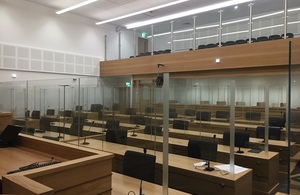‘Super courtroom’ opens in Manchester
Press release
More victims, defendants and witnesses will receive faster access to justice when the first ever ‘super courtroom’ opens in Manchester today (10 September).

- More suspected criminal gangs can face justice in a larger courtroom
- HM Courts and Tribunals Service triples the size of a courtroom to speed up justice for victims
- Latest step in national effort to tackle the impact of the pandemic on our justice system
Manchester Crown Court has been revamped to create a space that is three times the size of a usual courtroom – allowing for trials with up to 12 defendants, which usually involve gang-related crime such as county lines drug trafficking, murders, and money laundering.
The trials that require this level of space – known as multi-handers – have built up during the COVID-19 pandemic due to the need for social distancing. The super courtroom will create the space needed to get through these cases at speed, while preventing disruption to other cases in the building.
The court will make best use of HM Courts and Tribunals Service’s (HMCTS) rapid rollout of remote technology since the pandemic hit. This means that defendants can continue to appear remotely by video. More importantly, it also makes it possible for vulnerable witnesses and victims to relay their evidence from outside the courtroom, reducing the potential distress caused by being in the same room as the defendants.
Courts Minister, Lord Wolfson QC, said:
This super courtroom is just the latest step in our efforts to tackle the impact of the pandemic on our justice system.
It will get gang-related suspects in front of judges quicker – sending a message to would-be criminals that the justice system stands ready to hold them to account.
We’re not stopping here, though, and continue to pursue every option as we reduce delays and deliver speedier justice for victims.”
Today’s announcement forms part of the significant action taken to ensure the courts can operate at full throttle to recover from the pandemic and tackle delays. This includes:
- modifying 71 courtrooms to hold large multi-hander trials
- setting up Nightingale courtrooms across the country to increase capacity and ensure more trials can be heard – with a commitment to extend 32 courtrooms that deal with criminal trials until March 2022
- working to reopen an additional 60 existing Crown courtrooms following the lifting of most restrictions – including social distancing – in England and Wales
- ensuring there is no limit on the number of days that Crown Courts can sit for this year
- putting in place measures to make over 300 jury trial rooms available to safely run trials
- hosting more than 20,000 hearings using remote technology each week (across all jurisdictions) – a huge rise from a standing start in March 2020.
The impact of these measures is already being seen. England and Wales were among the first major jurisdictions in the world to resume jury trials, while latest figures show the number of outstanding cases has dropped by tens of thousands in the magistrates’ courts since last summer. Cases dealt with in the Crown Court remain at around pre-COVID-19 levels, and we’re listing thousands of cases each week.
Notes to editors
- Manchester Crown Court (Crown Square) has 15 courtrooms. Court 4 has been refurbished and extended to create the ‘super courtroom’. The existing 14 other courtrooms will continue to deal with criminal cases alongside this.
- Prior to the expansion of court 4, a 12-defendant trial would have used up two or three courtrooms, sometimes for several weeks.
- Work continues for a second super courtroom site at Loughborough Magistrates’ Court. We anticipate this will open in the autumn.
- The rollout of remote technology permits the attendance of parties and witnesses on video, where appropriate and in the interests of justice.
- Plans for more courts to reopen to help recover from the COVID-19 pandemic were announced in July.
- The Lord Chancellor recently set out his plan for court recovery in a speech delivered to the Law Society.
Published 10 September 2021